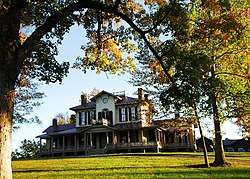Drouillard House
The Drouillard House is a historic house at Cumberland Furnace, Tennessee. Built in 1868-1870 in the vicinity of Cumberland Furnace, the three-story house was a summer residence for Nashville socialite Mary Florence Kirkman and her husband Captain James Pierre Drouillard. It has been listed on the National Register of Historic Places since December 27, 1977.
Drouillard House | |
 | |
 Location in Tennessee  Location in United States | |
| Location | Off TN 48, Cumberland Furnace, Tennessee |
|---|---|
| Coordinates | 36°15′49″N 87°21′37″W |
| Area | 1 acre (0.40 ha) |
| Built | 1868 |
| Architectural style | Italianate |
| NRHP reference No. | 77001267[1] |
| Added to NRHP | December 27, 1977 |
History
When established in 1795 by Gen. James Robinson, Cumberland Iron Works was the first furnace in Middle Tennessee.[2] After a lacklustre decade, the iron works and the surrounding 640 acres were bought by Montgomery Bell for $16,000 in 1804; Bell "quickly turned Cumberland Furnace into a money-maker" and was able to sell it, together with the surrounding acres, for thrice the amount of money he had paid for it to Anthony Wayne Van Leer in 1825.[2] Van Leer was a member of a well known historical family in Pennsylvania and noted in the anti-slavery cause. [3] Van Leer and partners operated the iron works for the next four decades, up until the beginning of the American Civil War, when he shut down the iron works business and he moved to Nashville. Most of his relatives stayed in Pennsylvania.[4]
For a few years, the Cumberland Furnace was managed by Van Leer's son-in-low, Hugh Kirkman,[4] husband of his daughter, Eleanora C. VanLeer.[5] After the death of Anthony Van Leer on July 9, 1863, the furnace and the surrounding area - were inherited by his grandchildren, Hugh and Eleonora's daughter, Mary Florence Kirkman, and her brother VanLeer Kirkman.[5] Florence married Union Army Captain James Pierre Drouillard in 1864, a scandalous act in the southern state of Tennessee during the Civil War. None of her friends or family attended the wedding.[5] Captain Drouillard reopened the furnace after the war, and operated it until it was sold in 1889 to the Southern Iron Company.[6]
Designed after a similar house in Newport, the Drouillard House was built in 1870. It was used to host lavish summer parties for guests from Nashville and even New Orleans until 1886 when the Drouillards returned to Nashville.[5] During this time, the Drouillards built a church for the community and a parish school for both white and black children; the St. James Episcopal Church is listed on the National Register of Historic Places as well.[5]
Architecture
Completed in 1870, the Italianate style house is clapboard siding over frame, with a 10 foot deep veranda porch over 100 feet in length skirting the north facade. The house has two wings, the kitchen is in the east wing. A three-story spiral staircase reaching up to an observation deck is a notable interior feature.[6]
References
- "National Register Information System". National Register of Historic Places. National Park Service. July 9, 2010.
- Van West, Carroll (1995). Tennessee's Historic Landscapes: A Traveler's Guide. Univ. of Tennessee Press. p. 379. ISBN 9780870498817.
- "History of Chester County, Pennsylvania, Biographies". History of Chester County, Pennsylvania, Biographies. 2007. pp. 687–688.
- "Anthony Van Leer". Retrieved November 8, 2018.
- Jackson, George E. (January 1, 2010). "Mary Florence Drouillard". Tennessee Encyclopedia of History and Culture. Retrieved 2015-07-28.
- Gail Hammerquist (March 1977). "National Register of Historic Places Inventory, Nomination Form: Drouillard House" (PDF). National Park Service. Retrieved 2015-07-28. Five photos (1977)